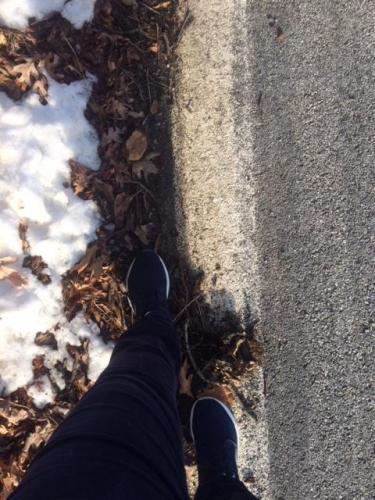Healthy Nurse, Healthy Nation™ Blog - Stay Safe Winter Weather Strategies
Published
How to prevent and handle 5 winter weather dangers.
 The approach of the holidays and the onset of winter bring a lot to look forward to. However, it’s important to be prepared safety-wise for colder weather. Although some winter injuries may involve bad luck (like a slip on ice), there are tactics you can use to keep yourself, your family, and your patients safer. Here are some common winter dangers and what you can do to prevent them:
The approach of the holidays and the onset of winter bring a lot to look forward to. However, it’s important to be prepared safety-wise for colder weather. Although some winter injuries may involve bad luck (like a slip on ice), there are tactics you can use to keep yourself, your family, and your patients safer. Here are some common winter dangers and what you can do to prevent them:
Walking on snow or ice
Although it’s best to avoid walking on ice, sometimes it’s unavoidable. Unfortunately, even the sturdiest snow boots may not protect you from falling.
Winter driving safety
Driving during harsh winter weather conditions can be dangerous, so it’s important to know how to handle your vehicle:
Frostbite
Frostbite occurs when parts of the body are exposed to extreme cold for a prolonged time. The condition usually affects the nose, ears, cheeks, fingers, or toes.
Frozen pipes
Freezing water in pipes could cause the pipes to burst and lead to flooding in your home. It’s a major safety issue, so try to keep the area around pipes insulated. Empty outdoor water pipes (like hoses, sprinklers, or pool plumbing) when bad weather is approaching.
If your pipes are already frozen, the American Red Cross suggests wrapping pipes in hot towels or using a hair dryer or space heater to melt the water within. Keep your faucet on so that the frozen water can drain as it melts.
Loss of power
If you lose power in the winter, try these tactics to stay warm.
Other power loss considerations
Have you encountered any of these winter issues? Or did you ever have a hard time getting to or leaving work because of bad weather? How did you handle it? Tell us on Facebook or in the discussion.
Reviewed 12/7/22
 The approach of the holidays and the onset of winter bring a lot to look forward to. However, it’s important to be prepared safety-wise for colder weather. Although some winter injuries may involve bad luck (like a slip on ice), there are tactics you can use to keep yourself, your family, and your patients safer. Here are some common winter dangers and what you can do to prevent them:
The approach of the holidays and the onset of winter bring a lot to look forward to. However, it’s important to be prepared safety-wise for colder weather. Although some winter injuries may involve bad luck (like a slip on ice), there are tactics you can use to keep yourself, your family, and your patients safer. Here are some common winter dangers and what you can do to prevent them:Walking on snow or ice
Although it’s best to avoid walking on ice, sometimes it’s unavoidable. Unfortunately, even the sturdiest snow boots may not protect you from falling.
- Penguin walk: Today.com recommends walking like a penguin whenever walking on ice or snow. That means putting your center of gravity over your front leg and leaning slightly forward.
- How to fall: If you do feel like you’re about to take a spill, try to land on a fleshy part of your body, like your stomach or bottom. Putting your hands out in front of you could cause you to break a wrist.
- Shoe add-ons: To minimize falls, consider adding slip-on ice grippers or cleats to your boots. They’ll help you have more traction in icy conditions.
- Salt: Don’t forget to keep rock salt on hand so you can clear up any ice in front of your residence and in your driveway.
Winter driving safety
Driving during harsh winter weather conditions can be dangerous, so it’s important to know how to handle your vehicle:
- Mind the gap: The American Automobile Association (AAA) recommends driving slowly in ice or snow and leaving an 8 to 10 second gap between your vehicle and the one in front of you. The extra space will give you more room in case you need to make an abrupt stop or slide on ice.
- Going uphill: Before driving up hills, try to build momentum on flat ground, so you don’t stall halfway through.
- Check the exhaust pipe: Always make sure your exhaust pipe is free from snow or ice blockages before starting your car.
- Car preparedness: Aim to keep your gas tank half full – helpful in case there’s a gas shortage due to severe weather or you get stuck in traffic due to bad road conditions.
- Commute considerations: If your shift is ending and conditions are poor, consider spending the night at your workplace. If you can’t get home, be sure to arrange safe travel for any children and pets in your life. And if you cannot get into work due to inclement weather, talk to your manager about your options. You have to make your safety a priority.
Frostbite
Frostbite occurs when parts of the body are exposed to extreme cold for a prolonged time. The condition usually affects the nose, ears, cheeks, fingers, or toes.
- Prevent frostbite: Dress appropriately for the cold. When out in the snow or cold temperatures, always wear a hat, ski mask, scarf, or other head covering. Use gloves, mittens, wool socks, and boots to protect the hands and feet. Hand and foot warmers (disposable air-activated heat packs) can also help prevent frostbite. Keep an extra set of warm weather gear in your car in case of emergency.
- Signs of frostbite: You may experience numbness and yellowish-gray skin that feels extra firm or waxy.
- What to do: According to the CDC, if you suspect you or someone else has frostbite, get into warmth immediately. Immerse the affected area in warm (not hot) water. You can also warm the area with body heat, just don’t massage it because that could cause more harm. Be sure to visit a medical professional as soon as possible to check for signs of hypothermia, a life-threatening condition.
Frozen pipes
Freezing water in pipes could cause the pipes to burst and lead to flooding in your home. It’s a major safety issue, so try to keep the area around pipes insulated. Empty outdoor water pipes (like hoses, sprinklers, or pool plumbing) when bad weather is approaching.
If your pipes are already frozen, the American Red Cross suggests wrapping pipes in hot towels or using a hair dryer or space heater to melt the water within. Keep your faucet on so that the frozen water can drain as it melts.
Loss of power
If you lose power in the winter, try these tactics to stay warm.
- Keep all exterior doors shut and use rolled up towels to block drafts and prevent cold air from coming inside.
- Insulate windows with black blankets or sheets.
- According to Accuweather, you can also put black fabric (including sheets, blankets, and towels) on the floor of your home where sunlight streams inside because black draws heat from the sun.
- Fill a bathtub with steamy hot water to bring warmth into the house.
- However, using generators, grills, camping stoves, or propane can lead to carbon monoxide poisoning, so always ensure carbon monoxide detectors have fresh batteries and are working properly.
Other power loss considerations
- Keep the refrigerator door closed so food within it will stay fresh for 4 to 6 hours.
- Keep the pantry stocked with shelf-stable canned vegetables, peanut butter, boxed milk, bottled water, and other essentials.
Have you encountered any of these winter issues? Or did you ever have a hard time getting to or leaving work because of bad weather? How did you handle it? Tell us on Facebook or in the discussion.
Reviewed 12/7/22
Blog Safety
12/11/2018 3:34pm CST



Post a Comment or Question